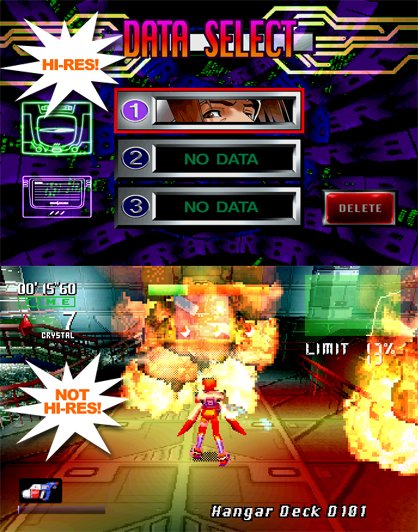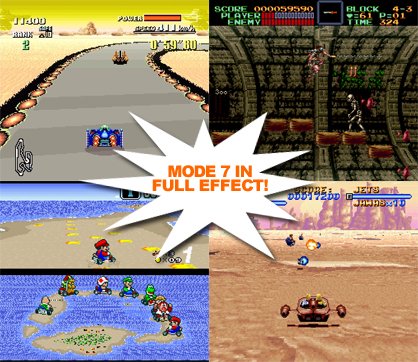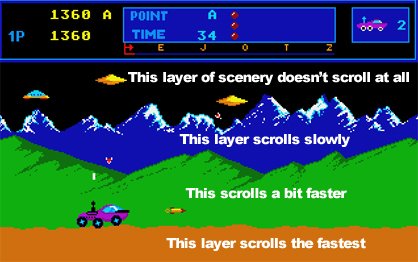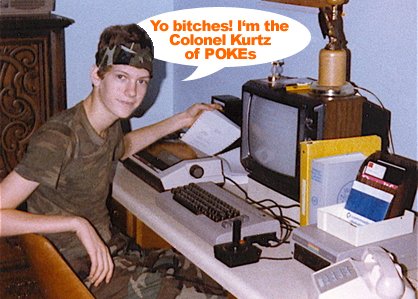Gaming words and phrases you never hear any more
A look back at the long-forgotten lexicon of gaming
High-score table
Pretty much decimated thanks to the continued decline of numerical accumulation in games and the popularization of leaderboards.
Hi-res graphics
When games started dabbling in high-resolution graphics, the 32-bit kids knew it was the dawn of exciting times. The term 'hi-res graphics' was the new benchmark of awesome. Sega Saturn's Virtua Fighter 2 looked so good it made almost-grown men weep. Another Saturn game, Sonic Team's Burning Rangers, had glorious hi-res title and menu screens, while in-game was still duff-o-vision. Check out the contrast:

Of course, now, everything looks sharp and shiny and gorgeous.
Kempston joystick compatible
Because if we couldn't play with our Competition Pro Plus, we weren't playing at all.
Isometric perspective
Not an experimental ambient-jazz-fusion-rock four-piece from Eastern Europe, but another 2D/3D trick. Q*bert, Zaxxon and Marble Madness all had a huge impact in arcades thanks in no small part to the radical viewpoint, while 8-bit gamers loved-up for Ant Attack, Knight Lore and Head Over Heels would evangelize the isometric perspective until it was way past their bedtime. It is occasionally used in games today, but the days of 'isometric perspective' being a conversation centrepiece are long gone.
Mode 7
SNES gamers might not have known exactly how it worked, but when they witnessed Mode 7's depth and perspective eye-fooling craftery in action, it instantly became the choice of a geek generation. Mode 7 is still used in some Flash 3D games today, but it's certainly not the buzzword wankgasm that it once was.

Above: F-Zero, Super Castlevania IV, Super Mario Kart and Super Star Wars all used Mode 7
Sign up to the GamesRadar+ Newsletter
Weekly digests, tales from the communities you love, and more
Music by Rob Hubbard
In the mid to late 80s, Rob Hubbard was an unstoppable music machine. He made a ludicrous amount of unfathomably good music. The phrase 'Music by Rob Hubbard' was as much a part of Commodore 64 culture as the words 'Press Play on Tape'.
Parallax scrolling
Old-school technique for producing a low-budget depth of field effect in 2D games. 1982 arcade game Moon Patrol was the first to use this form of optical trickery. For a detailed breakdown on how parallax scrolling works, check out the image below.

Playability and Lastability
Ambiguous vernacular fossils that were once mandatory review metrics. Occasionally still used by people with low speakability.
POKEs
The important bit of user-input cheat codes relentlessly employed by nerdlings during the days of 8-bit computers. Usurped by button-input cheat codes. A 'poke' is now more commonly known as a means of attracting another users' attention on Facebook.

Sound test
A nice little extra allowing players to listen to the game music and effects at their leisure. It felt like the developer was saying "Thanks for digging our game. Have this sound test as a small token of our appreciation." Developers don't seem to care so much for the small touches anymore. (So three cheers for Super Smash Bros which always treats us to a sound test)
Sprite flicker
When 8- and 16-bit consoles were dealing with too much detail on the screen simultaneously, sprites would have a nasty habit of flickering. And it's kind of a pain in the ass trying to dodge bullets you can't see. Curiously, last year's Mega Man 9 included sprite flicker as an optional extra in Legacy Mode.
Vector graphics
Could someone please make something awesome with vector graphics again. Battlezone and Star Wars may be well over two decades old, but they still look hotter than Megan Fox in a bikini. (Obviously that's completely not true, but since we said it we might as well use a picture of the Mega Fox in a bikini)

June 26, 2009


The industry's most taboo utterances

Promotional crap translated into real-world truth

A sexy collection of retro plastic



